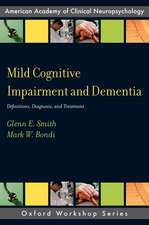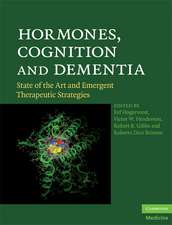Alzheimer's Disease and Frontotemporal Dementia: Methods and Protocols: Methods in Molecular Biology, cartea 670
Editat de Erik D. Robersonen Limba Engleză Hardback – 25 oct 2010
| Toate formatele și edițiile | Preț | Express |
|---|---|---|
| Paperback (1) | 902.20 lei 6-8 săpt. | |
| Humana Press Inc. – 23 aug 2016 | 902.20 lei 6-8 săpt. | |
| Hardback (1) | 725.42 lei 6-8 săpt. | |
| Humana Press Inc. – 25 oct 2010 | 725.42 lei 6-8 săpt. |
Din seria Methods in Molecular Biology
- 9%
 Preț: 791.63 lei
Preț: 791.63 lei - 23%
 Preț: 598.58 lei
Preț: 598.58 lei - 20%
 Preț: 882.98 lei
Preț: 882.98 lei -
 Preț: 252.05 lei
Preț: 252.05 lei - 5%
 Preț: 802.70 lei
Preț: 802.70 lei - 5%
 Preț: 729.61 lei
Preț: 729.61 lei - 5%
 Preț: 731.43 lei
Preț: 731.43 lei - 5%
 Preț: 741.30 lei
Preț: 741.30 lei - 5%
 Preț: 747.16 lei
Preț: 747.16 lei - 15%
 Preț: 663.45 lei
Preț: 663.45 lei - 18%
 Preț: 1025.34 lei
Preț: 1025.34 lei - 5%
 Preț: 734.57 lei
Preț: 734.57 lei - 18%
 Preț: 914.20 lei
Preț: 914.20 lei - 15%
 Preț: 664.61 lei
Preț: 664.61 lei - 15%
 Preț: 654.12 lei
Preț: 654.12 lei - 18%
 Preț: 1414.74 lei
Preț: 1414.74 lei - 5%
 Preț: 742.60 lei
Preț: 742.60 lei - 20%
 Preț: 821.65 lei
Preț: 821.65 lei - 18%
 Preț: 972.30 lei
Preț: 972.30 lei - 15%
 Preț: 660.49 lei
Preț: 660.49 lei - 5%
 Preț: 738.41 lei
Preț: 738.41 lei - 18%
 Preț: 984.92 lei
Preț: 984.92 lei - 5%
 Preț: 733.29 lei
Preț: 733.29 lei -
 Preț: 392.60 lei
Preț: 392.60 lei - 5%
 Preț: 746.26 lei
Preț: 746.26 lei - 18%
 Preț: 962.66 lei
Preț: 962.66 lei - 23%
 Preț: 860.22 lei
Preț: 860.22 lei - 15%
 Preț: 652.64 lei
Preț: 652.64 lei - 5%
 Preț: 1055.50 lei
Preț: 1055.50 lei - 23%
 Preț: 883.87 lei
Preț: 883.87 lei - 19%
 Preț: 491.89 lei
Preț: 491.89 lei - 5%
 Preț: 1038.86 lei
Preț: 1038.86 lei - 5%
 Preț: 524.16 lei
Preț: 524.16 lei - 18%
 Preț: 2122.34 lei
Preț: 2122.34 lei - 5%
 Preț: 1299.23 lei
Preț: 1299.23 lei - 5%
 Preț: 1339.12 lei
Preț: 1339.12 lei - 18%
 Preț: 1390.26 lei
Preț: 1390.26 lei - 18%
 Preț: 1395.63 lei
Preț: 1395.63 lei - 18%
 Preț: 1129.65 lei
Preț: 1129.65 lei - 18%
 Preț: 1408.26 lei
Preț: 1408.26 lei - 18%
 Preț: 1124.92 lei
Preț: 1124.92 lei - 18%
 Preț: 966.27 lei
Preț: 966.27 lei - 5%
 Preț: 1299.99 lei
Preț: 1299.99 lei - 5%
 Preț: 1108.51 lei
Preț: 1108.51 lei - 5%
 Preț: 983.76 lei
Preț: 983.76 lei - 5%
 Preț: 728.16 lei
Preț: 728.16 lei - 18%
 Preț: 1118.62 lei
Preț: 1118.62 lei - 18%
 Preț: 955.25 lei
Preț: 955.25 lei - 5%
 Preț: 1035.62 lei
Preț: 1035.62 lei - 18%
 Preț: 1400.35 lei
Preț: 1400.35 lei
Preț: 725.42 lei
Preț vechi: 763.60 lei
-5% Nou
138.83€ • 144.40$ • 114.61£
Carte tipărită la comandă
Livrare economică 12-26 aprilie
Specificații
ISBN-10: 1607617439
Pagini: 270
Ilustrații: X, 277 p.
Dimensiuni: 178 x 254 x 23 mm
Greutate: 0.66 kg
Ediția:2011
Editura: Humana Press Inc.
Colecția Humana
Seria Methods in Molecular Biology
Locul publicării:Totowa, NJ, United States
Public țintă
Professional/practitionerCuprins
1. Contemporary Approaches to Alzheimer’s Disease and Frontotemporal DementiaErik D. RobersonPart I: Working with AD- and FTD-Related Molecules2. Preparing Synthetic A in Different Aggregation StatesW. Blaine Stine, Lisa Jungbauer, Chunjiang Yu, and Mary Jo LaDu3. Isolation of Low-n Amyloid β-Protein Oligomers from Cultured Cells, CSF, and BrainGanesh M. Shankar, Alfred T. Welzel, Jessica M. McDonald, Dennis J. Selkoe, and Dominic M. Walsh4. Detecting A*56 Oligomers in Brain TissuesMathew A. Sherman and Sylvain E. Lesné5. Assessing A Aggregation State by Atomic Force MicroscopyJustin Legleiter6. Measuring APP Carboxy-Terminal FragmentsLuke A. Esposito7. Detection of APP Intracellular Domain (AICD) in Brain TissueSanjay W. Pimplikar and Anupama Suryanarayana8. Cell-Based Assays for Regulators of Tau BiologyUmesh K. Jinwal and Chad A. Dickey9. Split GFP Complementation Assay for Quantitative Measurement of Tau Aggregation In situWanjoo Chun, Geoffrey S. Waldo, and Gail V.W. Johnson10. Apolipoprotein E Expression and PurificationYvonne Newhouse and Karl H. WeisgraberPart II: Model Systems and Outcome Measures11. Aβ Toxicity in Primary Cultured NeuronsAdriana Ferreira, Roxana C. Sinjoanu, Alexandra Nicholson, and Sara Kleinschmidt12. Manipulation of Gene Expression in the Central Nervous System with Lentiviral VectorsBinggui Sun and Li Gan13. Selecting a Mouse Model of Alzheimer’s DiseaseJeannie Chin14. Monitoring Spatial Learning and Memory in Alzheimer’s Disease Mouse Models Using the Morris Water MazeKimberly Scearce-Levie15. Step-by-Step In Situ Hybridization Method for Localizing Gene Expression Changes in the BrainJorge J. Palop, Erik D. Roberson, and Inma Cobos16. Real-Time Visualization of Axonal Transport in NeuronsYasuko Osakada and Bianxiao Cui17. Quantifying Biomarkers of Cognitive Dysfunction and Neuronal Network Hyperexcitability in Mouse Models of Alzheimer’s Disease: Depletion of Calcium-Dependent Proteins and Inhibitory Hippocampal RemodelingJorge J. Palop, Lennart Mucke, and Erik D. Roberson18. Epigenetic Changes in the Brain: Measuring Global Histone ModificationsGavin Rumbaugh and Courtney A. Miller
Recenzii
“This book brings together research authorities in the field of Alzheimer’s disease (AD) and frontotemporal dementia (FTD) to share their laboratory methods and protocols for molecular and model systems and outcome research in the field of neurodegenerative biomedical research. … The audience includes all laboratory scientists interested in molecular and neuroscience research that seeks a cause and cure for these two devastating disorders. … The book is thoughtfully written and will have the greatest appeal for those with a familiarity with laboratory research methods.” (Charlene Hoffman Snyder, Doody’s Review Service, February, 2011)
“This is a collection of relatively modern methodologies, focused primarily on the study of amyloid-β processing … . Research technicians will find the ‘notes’ sections particularly valuable … . provides a nice reference for anyone interested in studying putative models of Alzheimer’s disease. … Overall, the book is well organized, well written, appropriately succinct, and exceedingly useful in those areas that are addressed, and provides a valuable reference to the basic scientist studying Alzheimer’s disease.” (Rudy J. Castellani, Journal of Alzheimer’s Disease, Vol. 25, 2011)
Textul de pe ultima copertă
Alzheimer’s disease and frontotemporal dementia, two of the most prevalent neurodegenerative diseases, are dreaded disorders that attack the neural networks underlying memory and personality, systems that make us who we are. Major breakthroughs in recent years have spurred new research approaches to these conditions. In Alzheimer's Disease and Frontotemporal Dementia: Methods and Protocols, expert investigators bring together the many divergent areas of expertise used to study these diseases, including behavior, electrophysiology, confocal microscopy, and hardcore biochemistry. Beginning with an overview of the two diseases and contemporary research on them, the book continues with specialized protocols for working with amyloid-β peptide, tau, and apolipoprotein E as well as experimental systems for studying AD and FTD, including cell and animal models, and outcome measures that can be used to assess neuronal function in these systems. Written in the highly successful Methods in Molecular Biology™ series format, chapters include brief introductions to their respective topics, lists of the necessary materials and reagents, step-by-step, readily reproducible laboratory protocols, and notes on troubleshooting and avoiding known pitfalls.Authoritative and easy to use, Alzheimer's Disease and Frontotemporal Dementia: Methods and Protocols serves as an ideal guide for all scientists pursuing the cause and cure of these widespread and nightmarishly debilitating disorders.
Caracteristici
Descriere
Alzheimer’s disease and frontotemporal dementia, two of the most prevalent neurodegenerative diseases, are dreaded disorders that attack the neural networks underlying memory and personality, systems that make us who we are. Major breakthroughs in recent years have spurred new research approaches to these conditions. In Alzheimer's Disease and Frontotemporal Dementia: Methods and Protocols, expert investigators bring together the many divergent areas of expertise used to study these diseases, including behavior, electrophysiology, confocal microscopy, and hardcore biochemistry. Beginning with an overview of the two diseases and contemporary research on them, the book continues with specialized protocols for working with amyloid-β peptide, tau, and apolipoprotein E as well as experimental systems for studying AD and FTD, including cell and animal models, and outcome measures that can be used to assess neuronal function in these systems. Written in the highly successful Methods in Molecular Biology™ series format, chapters include brief introductions to their respective topics, lists of the necessary materials and reagents, step-by-step, readily reproducible laboratory protocols, and notes on troubleshooting and avoiding known pitfalls.Authoritative and easy to use, Alzheimer's Disease and Frontotemporal Dementia: Methods and Protocols serves as an ideal guide for all scientists pursuing the cause and cure of these widespread and nightmarishly debilitating disorders.









